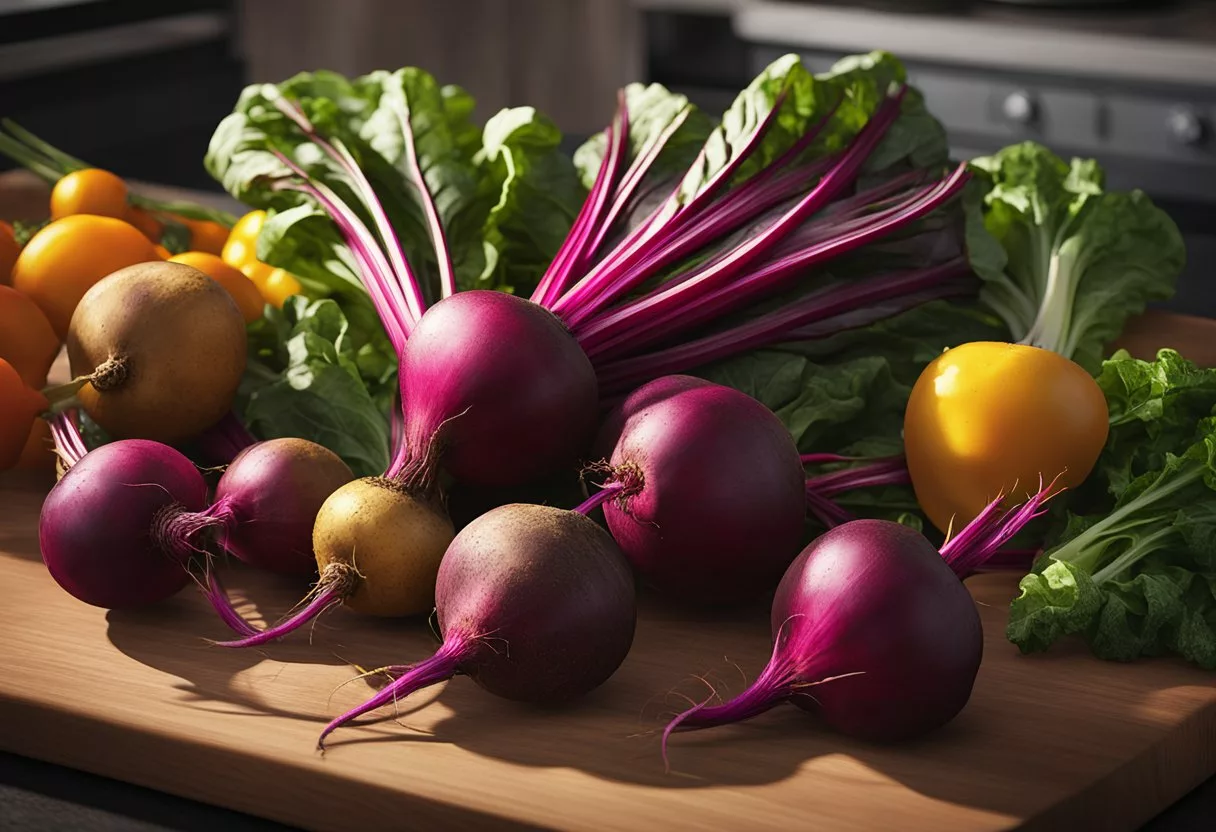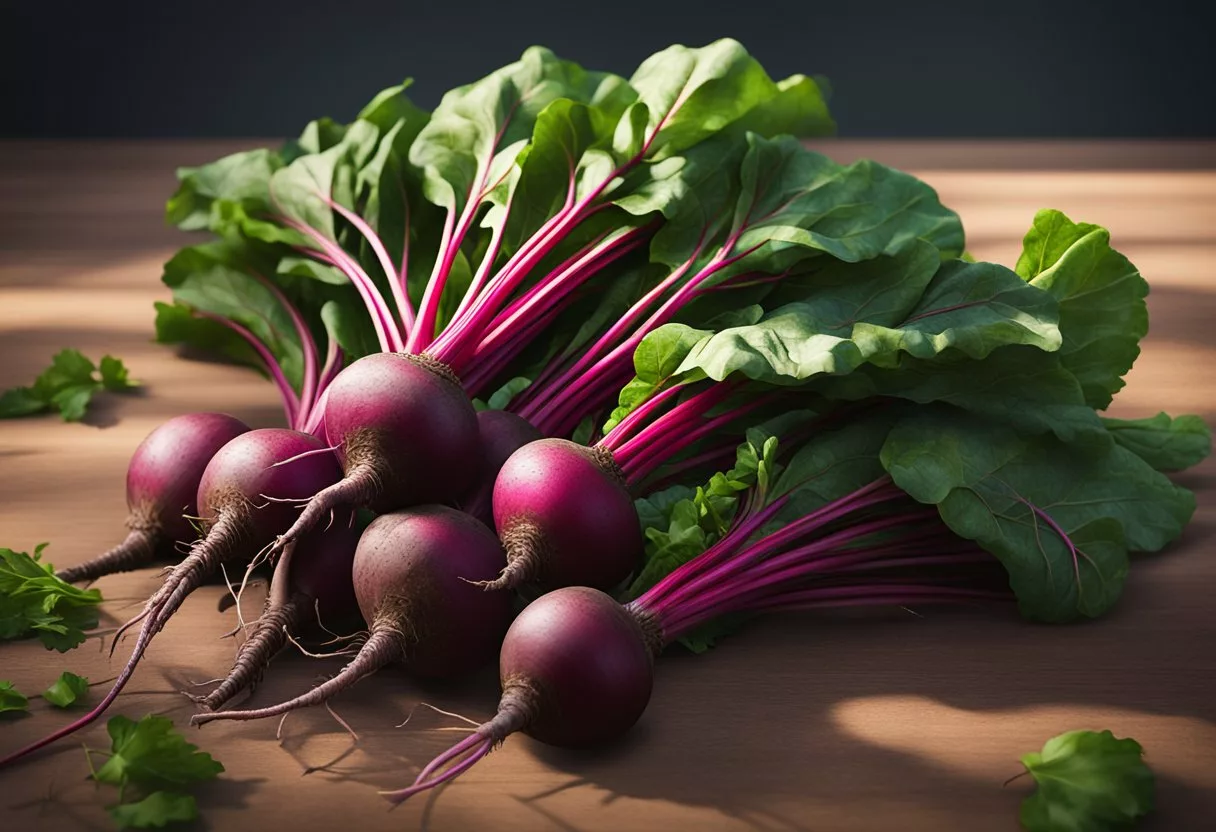Beets, or beetroot, are a nutritious root vegetable known for their vibrant color and distinct taste. Touted for a myriad of health benefits, they are not just a versatile ingredient in the culinary world but also a powerful ally in the realm of wellness and nutrition.
High in essential vitamins and minerals, beets contribute positively to a balanced diet. They are particularly rich in fiber, a critical component for optimal digestive health. Fiber encourages a healthy gut microbiome and aids in regular bowel movements.

In addition to fiber, beets are abundant in vital nutrients including folate (vitamin B9), manganese, potassium, and iron, making them a valuable addition to any meal.
Their pigments, known as betalains, have been studied for their anti-inflammatory properties and ability to support the body’s detoxification process.
Moreover, the presence of nitrates in beets has been linked to improved blood flow and lower blood pressure, which are beneficial for heart health.
As a whole food, beets can be eaten raw, juiced, roasted, or pickled. Each method offers a different flavor profile and possibly different nutritional benefits.
Key Takeaways
- Beets are high in fiber, supporting digestive health and gut bacteria.
- They contain significant levels of vitamins and minerals, contributing to overall nutrition.
- The nitrates and betalains in beets may improve heart health and reduce inflammation.
Nutritional Profile of Beets

Beets possess a rich nutritional profile encompassing a range of vitamins, minerals, and macronutrients that contribute to overall health. They are noted for their low calorie count paired with high nutrient density.
Vitamins and Minerals
Table 1: Essential Vitamins and Minerals in Beets
| Nutrient | Amount per 100g |
|---|---|
| Vitamin C | 4.9 mg |
| Folate (Vitamin B9) | 109 μg |
| Potassium | 325 mg |
| Manganese | 0.329 mg |
| Iron | 0.8 mg |
| Calcium | 16 mg |
| Source: NutritionData[1] |
Beets are a source of vitamin C, which is important for immune function, and folate, which is crucial for DNA synthesis and repair.
They also provide an array of minerals such as potassium, which is vital for heart health, and manganese for bone formation and nutrient metabolism. Beets also contain smaller amounts of iron and calcium.
Furthermore, beets are rich in nitrates, which the body converts into nitric oxide—a compound essential for blood vessel dilation and improved blood flow.
Macronutrients
Table 2: Macronutrient Composition of Beets
| Nutrient | Amount per 100g |
|---|---|
| Calories | 43 kcal |
| Protein | 1.6 g |
| Fat | 0.2 g |
| Carbohydrates | 9.6 g |
| Dietary Fiber | 2.8 g |
| Source: Healthline[2] |
With only about 43 calories per 100 grams, beets are primarily composed of carbohydrates, which include dietary fiber known to aid in digestion and prolong satiety.
The fiber in beets supports healthy bowel movements and may assist in maintaining blood sugar levels.
Though beets contain minimal quantities of protein and fat, their caloric energy is efficiently utilized by the body, making them a beneficial addition to a balanced diet.
Health Benefits of Beets

Beets are revered for their remarkable health benefits, from lowering blood pressure to bolstering heart health. Here’s how incorporating beets into the diet can impact various health aspects.
Cardiovascular Health
Beets are particularly beneficial for cardiovascular health. The naturally occurring nitrates in beets are converted into nitric oxide in the body, which helps improve blood flow and lower blood pressure.
Regular consumption of beets may contribute to a reduced risk of heart disease and stroke. The fiber in beets can also aid in maintaining healthy cholesterol levels, further protecting the heart.
Anti-Inflammatory Effects
Rich in antioxidants and compounds like betaine, beets exhibit anti-inflammatory properties. These components may help in preventing the onset of chronic diseases associated with inflammation, including obesity. Beets can be a powerful ally in the body’s fight against inflammation.
Digestive Health
With a significant amount of fiber, beets support digestive health by promoting regular bowel movements and contributing to a healthy gut.
High-fiber foods like beets can aid in preventing common digestive issues and may play a role in long-term digestive system health.
Exercise and Endurance
Beets are popular among athletes for their potential to enhance athletic performance and endurance.
Studies suggest that the nitrates found in beets can improve the efficiency of mitochondria, which produce energy in cells. This can potentially lead to better performance and longer endurance when exercising.
Beets and Disease Prevention

Beets are associated with numerous health benefits relevant to disease prevention. Specific compounds in beets, such as betalains and nitrates, have been studied for their potential in reducing the risk of certain diseases. This section explores how beets may contribute to cancer prevention, blood pressure management, and liver health.
Cancer Prevention
Beets contain betalains, which provide their vibrant color and have antioxidant and anti-inflammatory properties. These compounds are being researched for their potential role in cancer prevention, specifically colon cancer.
Studies suggest that betalains may help reduce both symptoms and biological markers of oxidative stress and inflammation that are associated with cancer development.
Managing Blood Pressure
The nitrates present in beets can be converted into nitric oxide in the body, a compound that helps dilate blood vessels and thus can lower blood pressure.
Regular consumption of beetroot juice has been shown to help manage blood pressure levels, supporting cardiovascular health.
Liver Health
Beets are a good source of betaine, which is involved in promoting liver health and protecting against liver disease.
Betaine assists in liver detoxification and also plays a role in preventing the accumulation of fatty deposits in the liver, which can lead to liver disease if left unchecked.
The Role of Beets in Diet and Nutrition

Beets are a nutritional powerhouse, offering a wealth of vitamins and minerals. They can be incorporated into a variety of meals and beverages to provide benefits such as improved heart health and enhanced athletic performance.
Beets in Everyday Meals
Incorporating beets into everyday meals adds not only vibrant color but also a range of nutritional benefits.
Raw beets can be thinly sliced or shredded to bring a fresh crunch to salads or coleslaw. When roasted, their natural sugars caramelize, offering a sweet contrast in savory dishes.
Boiled or cooked beets can be sliced and added to sandwiches or wraps, while beet greens, which contain an abundance of nutrients themselves, can be sautéed like spinach or mixed into pastas.
The versatility of beets extends to hummus and smoothies, where their rich, earthy flavor and nutrients can be seamlessly integrated.
- Roasting: Enhances sweetness; perfect for salads and sides.
- Boiling: Softens texture; ideal for purees or as a tender addition to meals.
- Raw: Crunchy texture; great in salads and coleslaw.
Beetroot Juice and Its Uses
Beetroot juice has gained popularity for its concentrated nutrition and potential health benefits.
Rich in nitrates, beet juice is often consumed to support cardiovascular health and improve oxygen flow during exercise.
It can be enjoyed on its own or as part of a nutritious smoothie mix.
However, one should be aware of beeturia, a harmless condition where urine may turn pink or red from the natural pigments in beets, which can occur after consuming beet juice.
In the realm of cooking, reducing beetroot juice can create intense glazes and sauces, adding a deep flavor and color to dishes.
Moreover, incorporating beet juice into homemade chips by seasoning and baking thinly sliced beets offers a healthier alternative to traditional snacks.
- Juicing: Concentrates nutrients; ideal for a quick, healthful drink.
- Smoothies: Combines with other ingredients for a nutrient-rich beverage.
- Cooking: Can be used creatively in recipes for glazes, chips, and sauces.
Additional Considerations for Beet Consumption

While beets are nutrient-packed and offer a range of health benefits, there are specific considerations to take into account when incorporating them into one’s diet.
These include potential dietary risks and the best methods for preparation and storage to optimize their health benefits.
Potential Risks and Side Effects
Beets are high in oxalates, substances that can contribute to the formation of kidney stones in susceptible individuals.
Therefore, those with a history of kidney stones may need to regulate their beet intake.
Furthermore, beets can cause beeturia, a harmless condition where urine may turn pink or red after consumption, which might be alarming to some but is not generally considered harmful.
Athletes may be interested in beets due to the vegetable’s ability to improve cognitive function and enhance athletic performance by increasing oxygen use.
However, the intake must be balanced, as excessive consumption can potentially lead to an imbalance of minerals.
Those with conditions like arthritis, osteoarthritis, or type 2 diabetes should consult healthcare professionals to determine an appropriate amount of beet in their diets as these conditions could be sensitive to the natural sugars and compounds found in beets.
Preparation and Storage Tips
To maximize the benefits and minimize potential risks associated with beet consumption, proper preparation and storage are essential.
It is recommended to wash beets thoroughly to remove any earth or dirt before consumption.
For optimal nutrient retention, roasted beets are preferable, as they help preserve the vitamins and minerals compared to methods like boiling.
Peeling beets is optional, and keeping the peel on can increase fiber intake.
When storing beets, keep them in a cool, moist environment, preferably in the refrigerator.
Beets should be stored away from light and water, as excess moisture can lead to spoilage.
Fresh beets can be kept for several weeks when stored properly, while cooked beets should be consumed within a few days to maintain their quality and nutritional value.
Varied Forms of Beets and Their Nutritional Differences
The nutritional profile of beets can vary significantly depending on their form—raw, cooked, or processed. This diverse range of products offers consumers different nutrients and health benefits.
Comparison of Raw vs. Cooked Beets
Raw beets are rich in fiber, which promotes digestive health, and they provide a good source of vitamins and minerals.
When cooked, particularly when boiled or roasted, beets lose some of their nutrient content, such as vitamin C; however, other nutrients, like betalains, become more bioavailable.
- Raw beets:
- Higher in fiber
- More vitamin C content
- Cooked beets (e.g., boiled, roasted):
- Increased betalains bioavailability
- Reduce oxalates which can inhibit nutrient absorption
Cooking methods, like roasting, can also concentrate the natural sugars found in beets, enhancing their sweetness and flavor.
Different Beet Products
A variety of beet products are available, each possessing unique nutritional attributes.
Beet greens—the leafy tops of the beet plant—are a nutrient-dense addition to the diet, offering vitamins A, C, and K, along with calcium and iron.
Beet juice is a concentrated source of nitrates, which the body converts into nitric oxide, a compound that enhances blood flow and oxygen delivery.
- Beet greens: High in vitamins A, C, and K
- Beet juice:
- Concentrated nitrates for better blood flow
- Often comes with reduced fiber compared to whole beetroot
Processed beet products, such as pickled beets or beet chips, are often accompanied by additional ingredients like salts, sugars, and oils, which can modify their health benefits.
Pickled beets may have probiotic properties depending on the pickling process, while beet chips might offer a healthier snack alternative with lower calorie content than traditional potato chips, provided they are minimally processed.
- Pickled beets: May offer probiotic benefits
- Beet chips: Can be a lower calorie, healthier snack option
Scientific Research on Beets

Recent studies have illuminated the multi-faceted health benefits of beets, a root vegetable, particularly in regard to blood pressure and cardiovascular health. They are not only a vibrant addition to the diet but also a rich source of phytonutrients. Here is a succinct summary of the scientific findings:
- Nitric Oxide Production: The consumption of beets increases in vivo nitric oxide availability, as documented in a study on The Potential Benefits of Red Beetroot Supplementation[3]. Nitric oxide is known for its role in vasodilation, potentially aiding in reducing hypertension.
- Anti-inflammatory Properties: Betalains, which include betacyanins and betaxanthins, are compounds found in beets that exhibit anti-inflammatory effects. They are being researched for their cancer-fighting potential, a point noted by medical professionals including registered dietitians.
- Blood Pressure and Heart Disease: A study highlighting beetroot’s antihypertensive effects draws a distinction between the impact of raw beet juice and cooked beets, with both having noticeable benefits on diastolic blood pressure. This is particularly significant in the context of heart disease prevention (Beetroot as a functional food[4]).
- Cognitive Function and Mitochondrial Efficiency: Beets are under investigation for their potential to enhance cognitive function through improved mitochondrial efficiency. This could be instrumental in the management and prevention of cognitive decline.
Frequently Asked Questions

This section addresses common queries about the nutritional benefits and potential health impacts of beetroots for various individuals, along with their role in special diets and daily consumption.
What specific advantages do beetroots offer for men’s health?
Beetroots may contribute positively to men’s cardiovascular health due to their ability to help lower blood pressure.
They are also recognized for their potential in improving exercise performance, which can be particularly beneficial for men engaging in regular physical activity.
How can beetroot consumption benefit women?
For women, beetroot’s high folate content is especially important for maternal health during pregnancy.
They also provide a good source of minerals and vitamins that can aid in iron replenishment, especially for women who are at a higher risk of iron-deficiency anemia.
Can anyone experience adverse effects from eating beetroot?
Some people might experience beeturia, a harmless condition where urine turns pink or red after consuming beets.
However, individuals with kidney stones should exercise caution due to beetroots’ oxalate content, which can contribute to stone formation.
What role do beets play in a weight loss diet?
Beetroots are low in calories and high in fiber which can assist in weight management by promoting feelings of fullness.
They are a healthy addition to a weight loss diet, aiding in reduced calorie intake without sacrificing essential nutrients.
In what ways can beetroot enhance skin health?
The vitamin C in beetroots is vital for skin health, as it participates in collagen synthesis and could help reduce the signs of aging.
Beetroot’s anti-inflammatory properties can also be beneficial for reducing skin inflammation and acne.
Are there any benefits to eating beets on a daily basis?
Eating beets daily can contribute to ongoing support for cardiovascular health. They also help maintain sustained energy levels and overall well-being. This is due to their variety of nutrients, including dietary fiber, vitamins, and antioxidants. However, it’s essential to maintain a balanced diet with a variety of foods.
References
- SELF Magazine: Women's Workouts, Health Advice & Beauty Tips. https://nutritiondata.self.com/facts/vegetables-and-vegetable-products/2348/2 Accessed November 4, 2025
- Beetroot 101: Nutrition Facts and Health Benefits. https://www.healthline.com/nutrition/foods/beetroot Accessed November 4, 2025
- The Potential Benefits of Red Beetroot Supplementation in Health and Disease. https://www.ncbi.nlm.nih.gov/pmc/articles/PMC4425174/ Accessed November 4, 2025
- Beetroot as a functional food with huge health benefits: Antioxidant, antitumor, physical function, and chronic metabolomics activity. https://www.ncbi.nlm.nih.gov/pmc/articles/PMC8565237/ Accessed November 4, 2025
